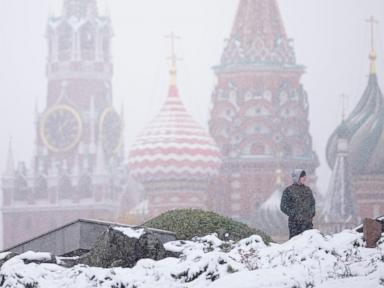ARTICLE AD BOX
Fireworks erupted in El Salvador's capital Sunday as gang-busting President Nayib Bukele claimed to have won reelection with more than 85 percent of votes cast: "a record in the entire democratic history of the world."
Bukele, 42, polls as Latin America's most popular leader, possibly the world, on the back of a war on gangs that has slashed homicide rates in the violence-weary country.
"According to our numbers we have won the presidential election with more than 85 percent of votes," he said on X, formerly Twitter, two hours after polls closed but before official results were announced.
As fireworks went off in different parts of San Salvador, hundreds of people gathered on a central square cheering and blowing whistles in celebration.
"We are more than happy with this victory: we will have Bukele for five more years," Lorena Escobar, a 38-year-old nurse, told AFP.
El Salvador's fearsome gangs took some 120,000 civilian lives in three decades, according to the government, which says criminal groups controlled 80 percent of the country when Bukele took power in 2019.
Under a state of emergency introduced in March 2022, his government has rounded up more than 75,000 gangsters -- real and suspected.
And last year, the country that was once one of the most dangerous in the world, saw the murder rate plummet to its lowest level in three decades -- far below the global average.
Bukele also claimed his Nuevas Ideas party had won 58 of the 60 seats in the legislative assembly, according to the president's X post, which closed with: "God bless El Salvador."
'Cancer of gangs'
Shortly after voting Sunday, Bukele batted away criticism of his rights record and boasted he had cured the Central American country of a "cancer" of gangs.
"Why do we have the biggest incarceration rate in the world? Because we... changed the murder capital of the world, the world's most dangerous country, into the safest country in the Western Hemisphere," he said.
"The only way to do that is to arrest all the murderers."
Activists say many innocents -- including minors -- have been caught up in the dragnet, locked up in inhumane conditions and even subjected to torture.
Thousands are held in a brand-new prison -- plugged as the largest in the Americas -- which the president had built in a matter of months.
"We did surgery, we are in radiotherapy, and we will leave healthy without the cancer of gangs," insisted Bukele, accusing Westerners of seeking to impose their "liberal ideas of what a democracy should be" on El Salvador.
'Dictator'
Bukele's very candidacy is controversial, having been made possible by a loyalist Supreme Court ruling allowing him to bypass a constitutional ban on successive terms.
On Sunday, asked whether he would change the law to seek a third term, the president replied: "I don't think constitutional reform is necessary."
He did not make it clear what his future plans were.
Bukele, who has ironically adopted the monicker "dictator" sometimes used to describe him, had urged Salvadorans to vote en masse "so that we have a legislative assembly that can continue approving the state of emergency."
In December, an Amnesty International report raised alarm over the "gradual replacement of gang violence with state violence," pointing to arbitrary arrests.
But for most Salvadorans, this seems to be a not-too-pressing issue.
"Things were ugly before," said Sandra Burgos, 68, who recently opened a small bookstore in La Campanera -- a once notoriously violent neighborhood of San Salvador which in the time of gang rule was divided into numerous no-go areas.
"Now we are fine. We can move around... before it was not possible."
'State violence'
Centralization of power is another concern, with the Bukele-aligned legislature having replaced top judges and the attorney general -- both institutions he had clashed with.
There are also worries about worsening antagonism towards critics and independent media, and of opaque public accounting.
El Salvador's ailing economy will be a major challenge for Bukele's second term, with high public debt and the president's investment of taxpayer money in bitcoin widely seen as a failed gambit.
Nearly 30 percent of Salvadorans lived in poverty in 2022, according to the UN's Economic Commission for Latin America and the Caribbean.
Voting in El Salvador is not compulsory, and turnout was just over 50 percent in 2019, when Bukele won in the first round with 53 percent of the vote.
(Except for the headline, this story has not been edited by NDTV staff and is published from a syndicated feed.)
.png)
 9 months ago
27
9 months ago
27








 English (US)
English (US)